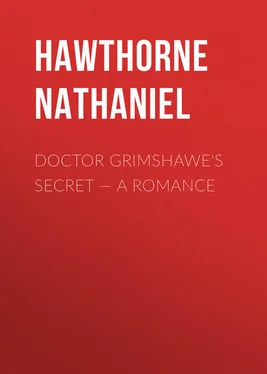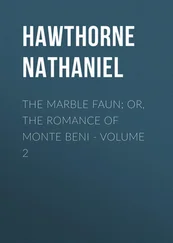Nathaniel Hawthorne - Doctor Grimshawe's Secret — a Romance
Здесь есть возможность читать онлайн «Nathaniel Hawthorne - Doctor Grimshawe's Secret — a Romance» — ознакомительный отрывок электронной книги совершенно бесплатно, а после прочтения отрывка купить полную версию. В некоторых случаях можно слушать аудио, скачать через торрент в формате fb2 и присутствует краткое содержание. Издательство: Иностранный паблик, Жанр: literature_19, foreign_antique, foreign_prose, на английском языке. Описание произведения, (предисловие) а так же отзывы посетителей доступны на портале библиотеки ЛибКат.
- Название:Doctor Grimshawe's Secret — a Romance
- Автор:
- Издательство:Иностранный паблик
- Жанр:
- Год:неизвестен
- ISBN:нет данных
- Рейтинг книги:5 / 5. Голосов: 1
-
Избранное:Добавить в избранное
- Отзывы:
-
Ваша оценка:
- 100
- 1
- 2
- 3
- 4
- 5
Doctor Grimshawe's Secret — a Romance: краткое содержание, описание и аннотация
Предлагаем к чтению аннотацию, описание, краткое содержание или предисловие (зависит от того, что написал сам автор книги «Doctor Grimshawe's Secret — a Romance»). Если вы не нашли необходимую информацию о книге — напишите в комментариях, мы постараемся отыскать её.
Doctor Grimshawe's Secret — a Romance — читать онлайн ознакомительный отрывок
Ниже представлен текст книги, разбитый по страницам. Система сохранения места последней прочитанной страницы, позволяет с удобством читать онлайн бесплатно книгу «Doctor Grimshawe's Secret — a Romance», без необходимости каждый раз заново искать на чём Вы остановились. Поставьте закладку, и сможете в любой момент перейти на страницу, на которой закончили чтение.
Интервал:
Закладка:
Nathaniel Hawthorne
Doctor Grimshawe's Secret — a Romance
PREFACE
A preface generally begins with a truism; and I may set out with the admission that it is not always expedient to bring to light the posthumous work of great writers. A man generally contrives to publish, during his lifetime, quite as much as the public has time or inclination to read; and his surviving friends are apt to show more zeal than discretion in dragging forth from his closed desk such undeveloped offspring of his mind as he himself had left to silence. Literature has never been redundant with authors who sincerely undervalue their own productions; and the sagacious critics who maintain that what of his own an author condemns must be doubly damnable, are, to say the least of it, as often likely to be right as wrong.
Beyond these general remarks, however, it does not seem necessary to adopt an apologetic attitude. There is nothing in the present volume which any one possessed of brains and cultivation will not be thankful to read. The appreciation of Nathaniel Hawthorne’s writings is more intelligent and wide-spread than it used to be; and the later development of our national literature has not, perhaps, so entirely exhausted our resources of admiration as to leave no welcome for even the less elaborate work of a contemporary of Dickens and Thackeray. As regards “Doctor Grimshawe’s Secret,” — the title which, for lack of a better, has been given to this Romance, — it can scarcely be pronounced deficient in either elaboration or profundity. Had Mr. Hawthorne written out the story in every part to its full dimensions, it could not have failed to rank among the greatest of his productions. He had looked forward to it as to the crowning achievement of his literary career. In the Preface to “Our Old Home” he alludes to it as a work into which he proposed to convey more of various modes of truth than he could have grasped by a direct effort. But circumstances prevented him from perfecting the design which had been before his mind for seven years, and upon the shaping of which he bestowed more thought and labor than upon anything else he had undertaken. The successive and consecutive series of notes or studies [Footnote: These studies, extracts from which will be published in one of our magazines, are hereafter to be added, in their complete form, to the Appendix of this volume.] which he wrote for this Romance would of themselves make a small volume, and one of autobiographical as well as literary interest. There is no other instance, that I happen to have met with, in which a writer’s thought reflects itself upon paper so immediately and sensitively as in these studies. To read them is to look into the man’s mind, and see its quality and action. The penetration, the subtlety, the tenacity; the stubborn gripe which he lays upon his subject, like that of Hercules upon the slippery Old Man of the Sea; the clear and cool common-sense, controlling the audacity of a rich and ardent imagination; the humorous gibes and strange expletives wherewith he ridicules, to himself, his own failure to reach his goal; the immense patience with which — again and again, and yet again — he “tries back,” throwing the topic into fresh attitudes, and searching it to the marrow with a gaze so piercing as to be terrible; — all this gives an impression of power, of resource, of energy, of mastery, that exhilarates the reader. So many inspired prophets of Hawthorne have arisen of late, that the present writer, whose relation to the great Romancer is a filial one merely, may be excused for feeling some embarrassment in submitting his own uninstructed judgments to competition with theirs. It has occurred to him, however, that these undress rehearsals of the author of “The Scarlet Letter” might afford entertaining and even profitable reading to the later generation of writers whose pleasant fortune it is to charm one another and the public. It would appear that this author, in his preparatory work at least, has ventured in some manner to disregard the modern canons which debar writers from betraying towards their creations any warmer feeling than a cultured and critical indifference: nor was his interest in human nature such as to confine him to the dissection of the moral epidermis of shop-girls and hotel-boarders. On the contrary, we are presented with the spectacle of a Titan, baring his arms and plunging heart and soul into the arena, there to struggle for death or victory with the superb phantoms summoned to the conflict by his own genius. The men of new times and new conditions will achieve their triumphs in new ways; but it may still be worth while to consider the methods and materials of one who also, in his own fashion, won and wore the laurel of those who know and can portray the human heart.
But let us return to the Romance, in whose clear though shadowy atmosphere the thunders and throes of the preparatory struggle are inaudible and invisible, save as they are implied in the fineness of substance and beauty of form of the artistic structure. The story is divided into two parts, the scene of the first being laid in America; that of the second, in England. Internal evidence of various kinds goes to show that the second part was the first written; or, in other words, that the present first part is a rewriting of an original first part, afterwards discarded, and of which the existing second part is the continuation. The two parts overlap, and it shall be left to the ingenuity of critics to detect the precise point of junction. In rewriting the first part, the author made sundry minor alterations in the plot and characters of the story, which alterations were not carried into the second part. It results from this that the manuscript presents various apparent inconsistencies. In transcribing the work for the press, these inconsistent sentences and passages have been withdrawn from the text and inserted in the Appendix; or, in a few unimportant instances, omitted altogether. In other respects, the text is printed as the author left it, with the exception of the names of the characters. In the manuscript each personage figures in the course of the narrative under from three to six different names. This difficulty has been met by bestowing upon each of the dramatis personæ the name which last identified him to the author’s mind, and keeping him to it throughout the volume.
The story, as a story, is complete as it stands; it has a beginning, a middle, and an end. There is no break in the narrative, and the legitimate conclusion is reached. To say that the story is complete as a work of art, would be quite another matter. It lacks balance and proportion. Some characters and incidents are portrayed with minute elaboration; others, perhaps not less important, are merely sketched in outline. Beyond a doubt it was the author’s purpose to rewrite the entire work from the first page to the last, enlarging it, deepening it, adorning it with every kind of spiritual and physical beauty, and rounding out a moral worthy of the noble materials. But these last transfiguring touches to Aladdin’s Tower were never to be given; and he has departed, taking with him his Wonderful Lamp. Nevertheless there is great splendor in the structure as we behold it. The character of old Doctor Grimshawe, and the picture of his surroundings, are hardly surpassed in vigor by anything their author has produced; and the dusky vision of the secret chamber, which sends a mysterious shiver through the tale, seems to be unique even in Hawthorne.
There have been included in this volume photographic reproductions of certain pages of the original manuscript of Doctor Grimshawe, selected at random, upon which those ingenious persons whose convictions are in advance of their instruction are cordially invited to try their teeth; for it has been maintained that Mr.
Читать дальшеИнтервал:
Закладка:
Похожие книги на «Doctor Grimshawe's Secret — a Romance»
Представляем Вашему вниманию похожие книги на «Doctor Grimshawe's Secret — a Romance» списком для выбора. Мы отобрали схожую по названию и смыслу литературу в надежде предоставить читателям больше вариантов отыскать новые, интересные, ещё непрочитанные произведения.
Обсуждение, отзывы о книге «Doctor Grimshawe's Secret — a Romance» и просто собственные мнения читателей. Оставьте ваши комментарии, напишите, что Вы думаете о произведении, его смысле или главных героях. Укажите что конкретно понравилось, а что нет, и почему Вы так считаете.












